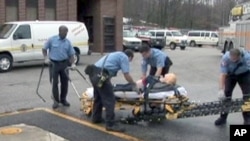A call for help comes into the Anne Arundel Fire Department. Emergency personnel do not know what type of patient they will deal with until they arrive on the scene.
To be prepared, firefighters and paramedics practice regularly. On this day, they are practicing with special equipment designed to accommodate overweight patients.
"People are bigger today than they used to be 20 to 30 years ago," says Michael Cox, a division chief with the Anne Arundel Fire Department in Maryland. "And we did identify a need for this type of equipment three to four years ago and went ahead and implemented it and put it in place here in the county."
The Centers for Disease Control and Prevention says obesity costs the United States more than $145 billion annually. Local governments shoulder much of the costs, including investments in the special equipment to care for overweight patients during emergency medical situations. U.S. health officials say one out of three American adults is obese. And a Rand Corporation study from 2007 says the number of severely obese adults is growing twice as fast as the moderately overweight.
To care for these larger Americans, emergency service providers are investing in new equipment. The Anne Arundel County team is practicing with a stretcher, ramp and winch system that can load a patient weighing up to 680 kilograms into an ambulance. The costs of such equipment add up.
"The bariatric stretchers are typically two to three times more expensive than the normal stretchers or standard stretchers that are used in medical units," says Cox.
The equipment can add another $25,000 to the cost of an ambulance. In the United States, sales of emergency equipment that can handle very heavy humans has more than doubled in the last 10 years.
Michael McAdams of neighboring Montgomery County Fire and Rescue says these patients are not just big, they can be fragile.
"Some of these patients, due to their size, due to the strain they've put on their body, they are more susceptible even to simple stress. I need you to move. I need you to walk. That can cause them respiratory distress and can put their cardiac system at stress and so those are issues I need to be aware of. "
Helping obese patients also requires investment in training to address their unique medical needs. And it's not just the cost of equipment that must be taken into consideration. There are also manpower issues. And it can require a lot of people, as many as 10 rescuers for a single emergency.




